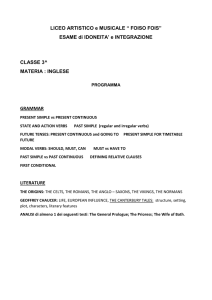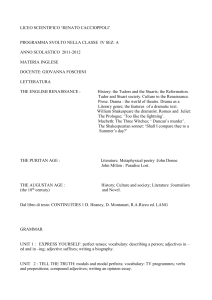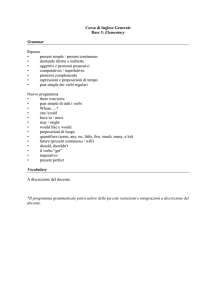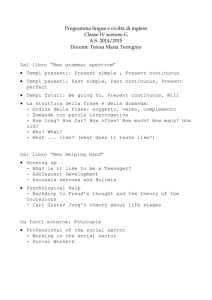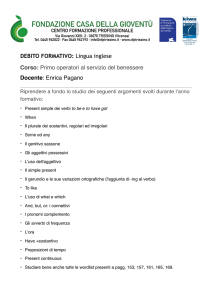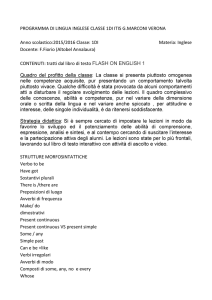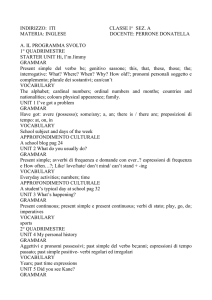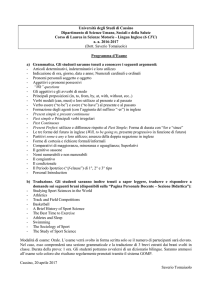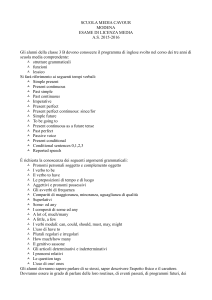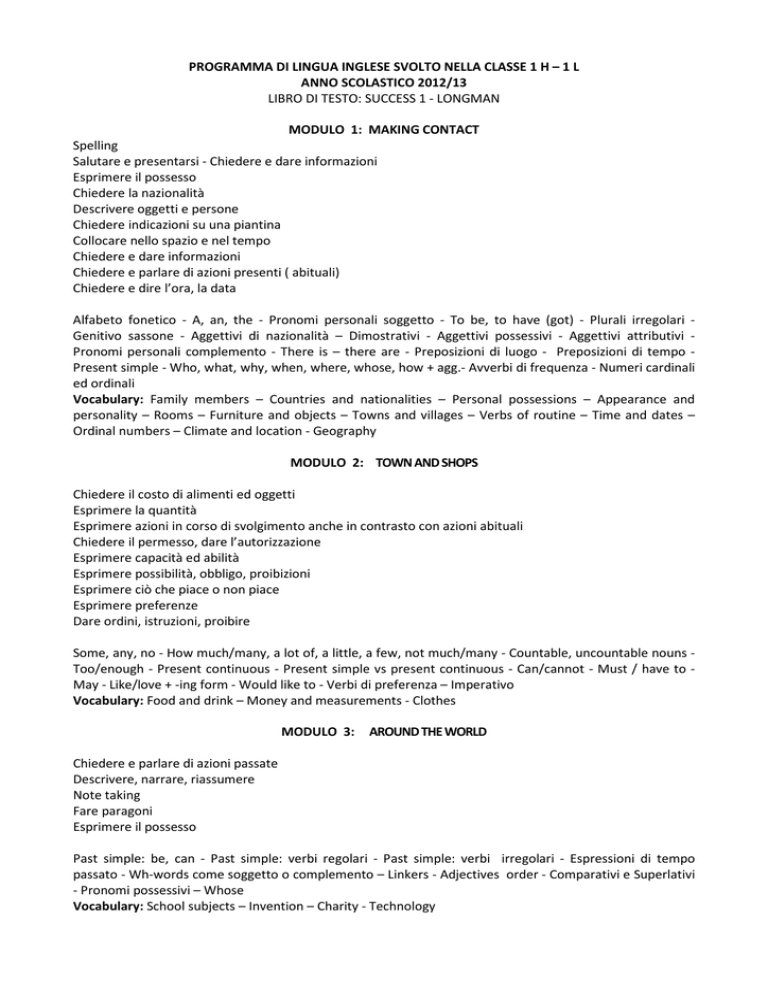
PROGRAMMA DI LINGUA INGLESE SVOLTO NELLA CLASSE 1 H – 1 L
ANNO SCOLASTICO 2012/13
LIBRO DI TESTO: SUCCESS 1 - LONGMAN
MODULO 1: MAKING CONTACT
Spelling
Salutare e presentarsi - Chiedere e dare informazioni
Esprimere il possesso
Chiedere la nazionalità
Descrivere oggetti e persone
Chiedere indicazioni su una piantina
Collocare nello spazio e nel tempo
Chiedere e dare informazioni
Chiedere e parlare di azioni presenti ( abituali)
Chiedere e dire l’ora, la data
Alfabeto fonetico - A, an, the - Pronomi personali soggetto - To be, to have (got) - Plurali irregolari Genitivo sassone - Aggettivi di nazionalità – Dimostrativi - Aggettivi possessivi - Aggettivi attributivi Pronomi personali complemento - There is – there are - Preposizioni di luogo - Preposizioni di tempo Present simple - Who, what, why, when, where, whose, how + agg.- Avverbi di frequenza - Numeri cardinali
ed ordinali
Vocabulary: Family members – Countries and nationalities – Personal possessions – Appearance and
personality – Rooms – Furniture and objects – Towns and villages – Verbs of routine – Time and dates –
Ordinal numbers – Climate and location - Geography
MODULO 2: TOWN AND SHOPS
Chiedere il costo di alimenti ed oggetti
Esprimere la quantità
Esprimere azioni in corso di svolgimento anche in contrasto con azioni abituali
Chiedere il permesso, dare l’autorizzazione
Esprimere capacità ed abilità
Esprimere possibilità, obbligo, proibizioni
Esprimere ciò che piace o non piace
Esprimere preferenze
Dare ordini, istruzioni, proibire
Some, any, no - How much/many, a lot of, a little, a few, not much/many - Countable, uncountable nouns Too/enough - Present continuous - Present simple vs present continuous - Can/cannot - Must / have to May - Like/love + -ing form - Would like to - Verbi di preferenza – Imperativo
Vocabulary: Food and drink – Money and measurements - Clothes
MODULO 3:
AROUND THE WORLD
Chiedere e parlare di azioni passate
Descrivere, narrare, riassumere
Note taking
Fare paragoni
Esprimere il possesso
Past simple: be, can - Past simple: verbi regolari - Past simple: verbi irregolari - Espressioni di tempo
passato - Wh-words come soggetto o complemento – Linkers - Adjectives order - Comparativi e Superlativi
- Pronomi possessivi – Whose
Vocabulary: School subjects – Invention – Charity - Technology
MODULO 4:
NOW AND THEN
Chiedere e parlare di azioni future
Fare previsioni, programmare, esprimere intenzioni
Espressioni di tempo relative al futuro
Parlare di azioni ed esperienze passate recenti
Esprimere il modo in cui si compie un’azione
Futuro: will - Future:( be) going to - Future: present continuous - Will vs going to vs present continuous Past participle - Gone/been - Present perfect - Present perfect vs past simple - Adverbs of manner Irregular adverbs of manner
Vocabulary: Holidays and travel – The environment – Health and fitness – Sports
GLI ALUNNI
LA DOCENTE
PROGRAMMA DI LINGUA INGLESE SVOLTO NELLA CLASSE 2H - 2O
ANNO SCOLASTICO 2012-13
LIBRO DI TESTO: SUCCESS 2 - LONGMAN
MODULO O: RIPASSO
Parlare di esperienze personali ed azioni in corso di svolgimento
Parlare di eventi passati e di abitudini nel passato
Parlare di piani ed intenzioni , usare il presente semplice con valore di futuro
Presente semplice e progressivo - Piani e intenzioni future ( going to e present continuous) - Verbi di stato e
di Azione - Il Passato semplice - Used to - Il presente semplice riferito ad orari ufficiali
MODULO 1: VIAGGIARE E CERCARE LAVORO
Esprimere suggerimenti, obbligo, necessità, possibilità, probabilità
Uso del dizionario –
Fare un colloquio di lavoro: Compilare un modulo per una richiesta di lavoro Presentare il proprio
curriculum vitae
Verbi modali: Should, must, can, may/might - Have to - Verb patterns
Vocabulary: Travel and souvenirs - Jobs
Focus: EDUCATION IN ENGLAND – ALTERNATIVE LONDON – FAMOUS PLACES IN BRITAIN AND ALL AROUND
THE WORLD
MODULO 2: MUSICA – EMOZIONI/SENTIMENTI – RELAZIONI
Parlare di avvenimenti in corso di svolgimento nel passato
Usare i pronomi relativi
Parlare di eventi recenti - Parlare di azioni cominciate nel passato che continuano nel presente
Prendere delle decisioni - Offrirsi di fare qualcosa - Fare delle promesse
Il passato progressivo - Le frasi relative Il Present Perfect semplice e progressivo - uso di for e since - Il
present Perfect con ever e never, already, just, yet, etc. will per fare promesse
Vocabulary: Music – Feelings and emotions - Relationships - Phrasal verbs
MODULO 3: GUARDARE AL FUTURO – LE NUOVE TECNOLOGIE
Fare previsioni
Parlare di progetti
Parlare di azioni imminenti
Parlare di probabilità - Formulare un’ipotesi realizzabile - Esprimere opinioni
Uso di to be going to - Uso del presente progressivo come futuro - Uso del futuro con will per fare delle
previsioni - First conditional May/might - Pronomi indefiniti - Differenze tra passato prossimo e prossimo
progressivo e passato prossimo - Question tags
Vocabulary: Technology – Horoscopes - Computer
MODULO 4: LA SALUTE – LO SPORT E L’ALIMENTAZIONE
Formulare ipotesi difficilmente realizzabili
Chiedere e dare consigli
Esprimere interesse e sorpresa per qualcosa e/o qualcuno
Il periodo ipotetico di secondo tipo – Revisione dei tempi modali – Verbi modali (per fare deduzioni al
presente e al passato – Echo questions
Vocabulary: Sports – Health – Descriptive adjectives
MODULO 5: I MEDIA E IL CRIMINE
Prendere parte ad una conversazione
Descrivere un’azione non compiuta dal soggetto
Esprimere desideri non piu’ realizzabili
Esprimere anteriorità nel passato
Esprimere preferenze
Il passivo - The Past Perfect - Gli articoli Vocabulary: The media – Newspapers – TV programmes - Crime and criminals
MODULO 6: IL CINEMA E I FILMS
Riferire conversazioni in modo indiretto
Formulare ipotesi irrealizzabili - Esprimere desideri non piu’ realizzabili
Parlare di desideri, progetti e intenzioni - Esprimere preferenze
Periodo ipotetico di terzo tipo - Review of conditionals -Phrasal Verbs, idioms, special use of make, have,
get
Vocabulary: Adjectives
GLI ALUNNI
LA DOCENTE
PROGRAMMA DI LINGUA INGLESE SVOLTO NELLA CLASSE 3 H
ANNO SCOLASTICO 2012/13
LITERATURE
THE BIRTH OF THE NATION
The Celts Celtic Britain - Stonehenge
The Romans
Anglo-Saxon culture
The Vikings
THEMES
Freedom and loyalty
The hero
The monster
Poetry
Poems and elegies – The figure of the scop
Beowulf: a primary epic
The Seafarer
THE MIDDLE AGES
The Feudal society
The Norman Conquest and feudalism
The Medieval world
Henry II, reforms and Becket
Kings, Magna Carta and Parliament
The Black Death and social change in the 14th century
Literary production: Medieval Drama
The Medieval Ballad
The Medieval narrative poem
Popular ballads
Geoffrey Chaucer:
The Canterbury Tales: “The wife of Bath” - “The Prioress” - “The Poor Parson”
THEMES
The chivalric ideal
The woman
The religious figures
The middle class
THE RENAISSANCE
Renaissance poetry
The English sonnet
William Shakespeare: “Shall I compare thee” – “My mistress’ eyes”
Renaissance drama
The world of Theatre:
Christopher Marlowe: Doctor Faustus
William Shakespeare: Romeo and Juliet – Hamlet – Macbeth - The Tempest
THE PURITAN AGE
The Civil War- The Stuart Dynasty
The Puritan mind
Poetry
Metaphysical poetry
John Donne: Holy Sonnets “Batter my heart” – Songs and Sonnets “A Valediction: Forbidden Mourning”
John Milton: Paradise Lost “Satan’s speech”
Sonnet:“On His Blindness”
GRAMMAR: Present tenses - Past tenses - Phrasal verbs - Word formation – Adjectives ending in –ing and
–ed - Expressions with time - Easily confused words
ARGOMENTI CLIL
Science:
The Environment
-The atmosphere-Pollution
-The water cycle
-Climate changes
The Cell.
-Parts of a cell
-What is DNA?
GLI ALUNNI
LA DOCENTE
PROGRAMMA DI LINGUA INGLESE SVOLTO NELLA CLASSE 4 H
ANNO SCOLASTICO 2012 -13
MODULO 1: THE RENNAISSANCE
English Renaissance
The Shakespearean Theatre: Drama as a literary genre
The features of a dramatic text
The influence of Plato and Seneca
William Shakespeare
Romeo and Juliet: The Balcony scene
Hamlet: To be or not to be
Macbeth: Duncan’s murder – A tale told by an idiot
The Tempest: Prospero and Caliban
THEMES:
Love, Courtly Love
Revenge
Ambition
The Evil
MODULO 2: THE PURITAN AGE
The Puritan Age
The Rise of Puritanism: Charles I – The English Civil War and the Commonwealth – The Puritans
Literature during the Puritan age
Focus: The role of British Parliament today - Compare and contrast the structure of the modern British
Parliament with that of the past
The role of the British monarchy today (Compare and contrast it with the past)
Metaphysical Poetry
John Donne
Song
Holy Sonnets: “Batter my heart”
Songs and Sonnets:
“A Valediction: Forbidding Mourning”
John Milton
Paradise Lost: Satan’s speech
Sonnet: On His Blindness
MODULO 3: THE AUGUSTAN AGE
The Restoration and the Augustan Age: A new kind of Monarchy - The Glorious Revolution - The Scottish
and Irish question
Literature during the Restoration – The triumph of science (Newton’s Discoveries) Restoration Comedy William Congreve The way of the world: The sealing of the deed
Scientific Rigour
Wit and Science The Royal society
The beginning of the Hanoverian dynasty The Augustan age The Age of Enlightenment
Reason and Sense
Augustan Literature
Journalism
The Rise of the novel
Daniel Defoe - Robinson Crusoe: Evil vs Good – Man Friday
Jonathan Swift - Gulliver’s Travels: Gulliver in the land of giants – The Laputians
Samuel Richardson – Pamela, or Virtue Rewarded: The rich despise the poor
MODULO 4: THE ROMANTIC AGE
The Age of Revolutions: The Industrial Revolution – The French Revolution – The Napoleonic Wars – Free
trade and political repression – The road to reform – The end of slavery
The Industrial society
Emotion versus reason
The Sublime
New Trends in poetry
The Gothic novel
Thomas Gray – Elegy written in a Country Churchyard
William Blake – Songs of innocence and songs of experience
London
The Lamb
The Tyger
Mary Shelley - Frankenstein
GRAMMAR
ESERCITAZIONI GRAMMATICALI E LESSICALI
Direct and reported speech – Past tenses – Used to – Present Perfect – Prepositions - Adjectives followed
by prepositions – Prepositions followed by word combinations – Phrasal verbs
GLI ALUNNI
LA DOCENTE

